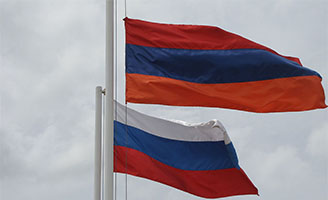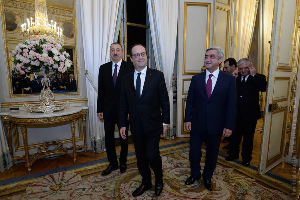Armenia Toughens Its Stance Against Turkey
By Erik Davtyan (03/04/2015 issue of the CACI Analyst)
On February 16, Armenia's President Serzh Sargsyan addressed a letter to the Speaker of Armenia's National Assembly Galust Sahakyan, informing him about his decision to recall the Armenian-Turkish protocols from the National Assembly. In the letter, the President stated that "the absence of political will, distortions of the letter and spirit of the protocols by the Turkish authorities and continuous attempts to articulate preconditions." Sargsyan also reiterated that the Turkish policy of denial and history revision was intensified on the eve of the Armenian Genocide Centennial. In 2009, Armenia and Turkey signed two protocols on the establishment of diplomatic relations and on the development of relations. However, the ratification process was halted and the prospect of new negotiations and agreements is negligible.
As Armenia prepares to commemorate the centennial of the Armenian genocide, contacts between Armenian and Turkish authorities are taking on highly negative overtones. On January 29, the State Commission on the Coordination of Events Dedicated to the 100th Anniversary of the Armenian Genocide issued a pan-Armenian declaration calling upon Turkey and other states to recognize and condemn the genocide, and declares Armenia's intention to present a package of legal claims against Turkey.
The recall of the two protocols obtained reactions from Armenian as well as Turkish high officials. Turkish Foreign Ministry spokesperson Tanju Bilgic qualified this step as an "insincere and unstable position" towards the protocols. As for Armenia's official position, Deputy Foreign Minister Shavarsh Kocharyan explained in an interview to Armenia's Public Television that the recall was a clear message to the international community (including Turkey), aiming to stress the unacceptability of the Turkish policy of "denial and preconditions." Taking into consideration the fact that Turkey has recently launched new initiatives regarding the 100th anniversary of the battle of Gallipoli, Kocharyan believes that the recall of the protocols was quite logical.
On the eve of the Armenian Genocide Centennial, almost all steps taken by the Armenian authorities are highly welcomed among the Armenian public. Boris Navasardyan, chairman of the Yerevan Press Club, said that the recall of the protocols is widely perceived as a "quite justified attitude." According to politologist Alexander Markarov, the protocols were de facto recalled much earlier, so this decision de jure put an end to the whole process that kicked off in 2008 in the framework of "football diplomacy".
When signing the protocols in Zürich, both Turkey and Armenia wanted to express their willingness to restore their diplomatic relations. However, after six years, the ambiguous future of the protocols does not play in Armenia's favor, especially after Sargsyan toughened Armenia's official position on the Armenian Genocide issue. The deputy director of the Caucasus Institute, Sergey Minasyan, thinks that in terms of both Armenia's foreign and domestic policy, there was no need to keeping the protocols in the National Assembly.
Experts and politicians believe that the protocols contradict the pan-Armenian declaration issued at the end of January. Edmon Marukyan, a deputy of Armenia's National Assembly, as well as the Director of the Armenian Genocide Museum & Institute Hayk Demoyan, say that the logic of the Zürich protocols did not correspond to that of the pan-Armenian declaration, so there was no doubt that President Sargsyan would take that step.
Though there are no contradictory opinions on this issue, some political parties call for a much tougher stance regarding the Zürich protocols. Giro Manoyan, a bureau member of the Armenian Revolutionary Federation (ARF), says that "this is a welcome step, but is not enough: it is necessary to completely neutralize and recall the signatures." Representatives of the Armenian Diaspora, which plays a key role in promoting Armenian national interests, including the international recognition of the Genocide, has always condemned any attempt to reconcile relations between Armenia and Turkey. According to the Executive Director of the Armenian National Committee of America (ANCA) Aram Hamparian, "Armenia should never have signed these one-sided agreements." As for the recall of the protocols, Hamparian believes that the withdrawal "represents a step in the right direction – one that needs to be followed immediately by the next logical step of withdrawing Armenia's signature from these Ankara-inspired accords".
CACI Analyst, February 18, 2015
CACI Analyst, February 18, 2015 (.pdf)
Contents
Analytical Articles
GYUMRI MURDERS THREATEN TO DISRUPT ARMENIA’S RELATIONS WITH RUSSIA, by Eduard Abrahamyan
SANCTIONS, ENERGY PRICES, AND RUBLE DEPRECIATION CHALLENGE CIS GOVERNMENTS, by Stephen Blank
DAGESTAN’S JIHADISTS AND HARAM TARGETING, by Emil Souleimanov
AZERBAIJAN INVESTS IN UPGRADING ITS TRANSPORT INFRASTRUCTURE, by John C.K. Daly
Field Reports
ARMENIAN PRESIDENT REJECTS TURKISH INVITATION TO ATTEND GALLIPOLI ANNIVERSARY, by Erik Davtyan
POLICE ARRESTED FOR OLD MURDER CASE IN GEORGIA, by Eka Janashia
KYRGYZSTAN DEBATES ELECTORAL SYSTEM REFORM, by Arslan Sabyrbekov
TAJIK PRESIDENT REVIEWS CHALLENGES IN ANNUAL ADDRESS TO PARLIAMENT, by Oleg Salimov
Gyumri Murders Threaten to Disrupt Armenia's Relations with Russia
By Eduard Abrahamyan (02/18/2015 issue of the CACI Analyst)
Armenia’s relationship with Russia has never been simple. Although Russia has considered Armenia a reliable ally since its independence, the relationship has never transformed into a formal partnership. Russia’s policy of double standards on the Nagorno-Karabakh issue and its delivery of weaponry to Azerbaijan has gradually increased distrust in Armenian society towards Russia in recent years. A bloody incident in Gyumri on January 12, 2015, when a soldier from the deployed Russian 102nd military base killed the entire Avetisyan family in their sleep, including two children, has catalyzed a vivid debate in Armenia on the nature of the relationship to Russia.

Armenian President Rejects Turkish Invitation to Attend Gallipoli Anniversary
By Erik Davtyan (02/18/2015 issue of the CACI Analyst)
On January 16, Armenia’s President Serzh Sargsyan rejected his Turkish counterpart Recep Tayyip Erdogan’s invitation to take part in the events commemorating the centenary of the Battle of Gallipoli. Earlier this month, Erdogan sent out invitation letters to 102 heads of state to attend the events. Every year, Turkey celebrates March 18 as the anniversary of the Gallipoli victory over the Allies, but this year Turkish authorities decided to celebrate it on April 24 when Armenians all over the world will commemorate the Centennial of the Armenian Genocide. Therefore, President Sargsyan in his response stressed that the invitation serves “a simple-minded goal to distract the attention of the international community from the events dedicated to the centennial of the Armenian Genocide.”
Armenia’s president underlined that “it is not a common practice for Armenians to be hosted by the invitees, without receiving a response to our invitation.” This response was stipulated by the fact that Erdogan had not answered Sargsyan’s official invitation to commemorate the Centennial of the Genocide this year in Yerevan. During his visit to Ankara in August, 2014, Armenia’s Minister of Foreign Affairs Edward Nalbandian had handed Sargsyan’s invitation to Erdogan, but no answer has been received till now. During the next two weeks, Sargsyan’s response to the invitation provoked some criticism in Turkey. On January 31, Ibrahim Kalın, a spokesperson of the Turkish president, said that “it is impossible to admit remarks by Sargsyan aiming at the Turkish president’s invitation to Armenia, which are against diplomatic practices.” The same opinion was shared by Turkey’s Ministry of Foreign Affairs.
During the 15th meeting of the Armenia-EU Cooperation Council in Brussels, Foreign Minister Nalbandian reaffirmed Sargsyan’s position, adding that it is inappropriate to organize such an event in Turkey on April 24 and that it is unbelievable that anybody can perceive this as a proper step. Nevertheless, the idea to commemorate the battle was welcomed by Azerbaijan’s President Ilham Aliyev. During his visit to Turkey, Aliyev said that “the choice of the date was very important.”
Erdogan’s invitation was unanimously criticized in Armenia. The head of the Institute of Oriental Studies of the Armenian National Academy of Sciences, turkologist Ruben Safrastyan believes that this step aims at undermining Armenia’s initiative to invite heads of states to Yerevan on April 24. According to the expert, the Turkish President wants to draw the international community’s attention to the Gallipoli victory, rather than the Armenian Genocide. The same view was shared by another turkologist, Ruben Melkonyan. In his interview to Armlur.am, he qualified Erdogan’s step as a falsification of history and a counter step against the events dedicated to the Centennial of the Armenian Genocide. Shortly after Erdogan’s statement, the Coordination Council of Armenian Organizations of France made a respective statement, qualifying the step as a part of the Turkish policy of denial, aimed at diminishing the international resonance of the Centennial events in Yerevan.
Erdogan’s invitation was not the last message issued to Armenia. On January 20, Turkish Prime Minister Ahmed Davutoglu made a statement on the commemoration of the 8th anniversary of the assassination of Armenian journalist Hrant Dink. He hoped that Armenia and Turkey will begin addressing “the great trauma that froze time in 1915” and underlined that “Turkey has transcended this critical threshold and relinquished the generalizations and stereotypical assertions of the past.” Davutoglu ensured that the parties will manage to give “the due recognition to the Armenian cultural heritage in Turkey” and expressed hope that the two nations will be able to contribute to a new beginning, demonstrate the wisdom to understand each other and contemplate a future together.
This step by the Turkish authorities provoked a second wave of complaints in Armenia. In an interview to Armenpress news agency, turkologist Hakob Chakryan said that Davutoglu had previously used this approach many times, however this one was, in fact, stipulated by internal criticism in Turkey. Some experts, especially Safrastyan, qualified the statement as “the continuation of the official policy of Turkey regarding the Armenian Genocide.” On this occasion, the Chair of the Standing Committee on Foreign Relations of the National Assembly of Armenia, Artak Zakaryan, blamed Turkey for continuing a policy of denial regarding the Genocide and mentioned that unlike Davutoglu’s statement, the first attempts to initiate the signing of an agreement were always carried out only by Armenia. Zakaryan believes that Turkey is not ready to bolster the mutual trust, to break the stereotypes and to hold a dialogue with Armenia.
The Nagorno-Karabakh Peace Process After the Helicopter Incident
By Huseyn Aliyev (12/10/2014 issue of the CACI Analyst)
On November 12, an Armenian combat helicopter was shot down by Azerbaijani defense forces after an attempted attack on Azerbaijani positions over the disputed region of Nagorno-Karabakh. The incident took place just two weeks after the fruitless peace talks between Azerbaijan’s President Ilham Aliyev and his Armenian counterpart Serzh Sargsyan, organized on the initiative of French President Francois Hollande in Paris. Although the escalation of violence on the border between the Armenian-controlled breakaway region of Nagorno-Karabakh and Azerbaijan has been growing steadily since the early summer, this particular incident appears to be the highest point yet in the confrontation.





